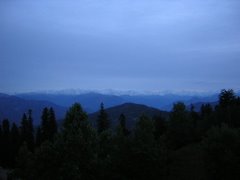I attended the 172nd edition of Thyagaraja Aradhana (tribute) music festival which honoursthe legendary Carnatic music composerevery year on his death anniversary. Thyagaraja composed most of his music while living in Thiruvaiyaru where he died in 1846. The Festival is held in the premises of his samadhi (memorial) on the banks of the Cauvery river. This is perhaps the oldest classical music festival in India.
This is the Thyagaraja image in Kolam in front of a house in Thiruvaiyaru
This is the Thyagaraja image in Kolam in front of a house in Thiruvaiyaru
The musicians consider it a privilege to perform in the Aradhana and come here paying themselves for their travel and accomodation. They do not get any performance fees either. Some of them come regularly every year.Those learning Carnatic music worship Thyagaraja as a saint and perform pujas at his temple.
The temple
The temple
There are no tickets for the concerts which are open to the public. The hall becomes full and overflowing outside for the Pancharathna event and when celebrities come to sing. This year the celebrity singer was Jesudas from Kerala.
Thiruvaiyaru is a quiet small town with a population of around 20,000. It does not have proper restaurants or hotels to accommodate the artistes and festival visitors, who stay in Thanjavur, 12 km away. Thiruvaiyaru is known as the land of five rivers (Iyaru means five rivers) namely Cauvery, Vennar, Vettar, Vadavar, and Kudamurutti rivers. The deity in the famous temple in the town is Aiyarappan /Panchandeeswarar which mean Lord of five rivers.
There is belief that those who die in Thiruvaiyaru, considered as the sacred equivalent of Benares, will go to heaven. Some old people come to stay in the Chattirams (charity accommodation) at their terminal stage waiting to die there. Sixteenth day Ceremonies as well as anniversary rites for the dead are done on the bank of the Cauvery river in the town. There are over fifty Brahmin families which live on the income of performing the rites for the dead.
The music hall is open-air with shamiana cloth cover on top. It feels as though the music flows into the river. The music- filled water has made the Cauvery delta region fertile, as evident from the lush green fields of rice, coconut, sugar cane, betel leaf and bananas.
The region of Thiruvaiyaru and Thiruvarur was part of the Chola dynasty of Thanjavur which had patronised arts and culture and built historic temples. The Chola dynasty has a distinct place in Indian history. Cholas were the only Indian rulers who ventured outside India conquering overseas territories and colonising parts of South East Asia. Alas.. History has its own way of humbling the proud. After the decline of Cholas in the 15th century, Thanjavur came under the Telugu speaking Governors appointed by Vijayanagara empire. In 1675 the Marathas took over Thanjavur and ruled till they lost to the British in the ninteenth century. There is still a Maratha dynasty prince living in the Thanjavur palace surrounded by a small Marathi community. The Maratha kings promoted Sanskrit and before them the Nayaks patronised Telugu language. So this explains the Telugu and Sanskrit compositions of Thyagaraja who did not bother to use Tamil in his music although he had lived in the heart of Tamilnadu.
Poor me.. despite the fact that my village is close to Thiruvaiyaru,I did not understand a word of the songs of my neighbour Thyagaraja which were only in Telugu and Sanskrit...Moopanar, the President of the Board of the Thyagaraj Aradhana Trust do not understand either..One of those (among many others) cultural contradictions in Tamil society.








2 comments:
Sir,Very good Article, gave the feeling of seeing Aradana by my own eyes. Although Music does not have language barrier, we could connect well with the songs in a language which is known to us. It is kind of understandable that Shri Thiyagaraja rendered keerthans only in Telugu and Sanskrit, hence there are no Tamil keerthanas to be sung in Thruvaiyaru.. but in ChennaiDecemb season, I always wonder why the singers don't sing many Tamil songs (except those thukkadas - bit of popular kirtis / songs. Exception to that was Sanjay's Tamizhlum Naanum during last Dec... It was adorable and captivating for two reasons - it was by the great Sanjay and it was in Tamil... Hope things will change at least in Chennai... Thiruvaiyaru, we can't help as we have only Telugu / Sanskrit keerthanas from the most famous of the music Trinity, Shri. Thiyagayya. I am happy that you have attended it...
A good musician is expected to be a good human being too. Being 'good' also includes being non-discriminatory and possessing the quality of gratitude. But tyagaraja didnt have those qualities and for the same reason, i despise and avoid his songs. Im aware as to how hes being revered even by carnatic stalwarts, but who cares. While not forgetting one's mother tongue is a high quality, neglecting/discriminating the language of your land, where you could live without any discrimination, also is one of the worst qualities.
I wish the TN govt took some steps in engaging/nurturing tamil scholars in composing new carnatic songs and to promote tamil music, with liberal funds.
Post a Comment